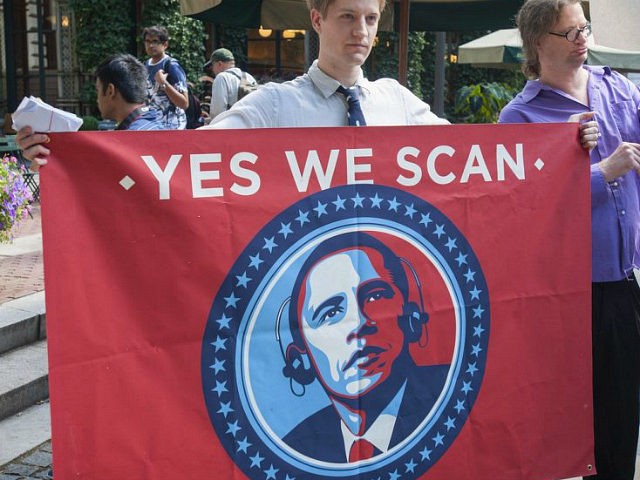The American Civil Liberties Union has uncovered memos that show the National Security Agency (NSA) and FBI “violated specific civil liberty protections during the Obama administration by improperly searching and disseminating raw intelligence on Americans or failing to promptly delete unauthorized intercepts,” as reported by The Hill on Tuesday.
The memos, which The Hill was able to review, were obtained through a Freedom of Information Act (FOIA) request by the ACLU. They cover compliance with privacy rules between 2009 and 2016. Equivalent assessments of the Trump administration’s first year will not be prepared until next spring.
NSA spokesman Michael Halbig is quoted arguing that the 90-plus incidents documented by the memos represent a small fraction of the hundreds of thousands of phones and email addresses monitored under the FISA Section 702 warrantless surveillance program – an argument that may not be all that comforting to privacy advocates. Halbig also said the violations described by the memos are proof that the NSA’s compliance program is working.
Representatives of several agencies echoed Halbig’s point that the compliance system and its strict reporting requirements are helping the government to constantly improve its performance and insisted the oversight system deserves credit for detecting and addressing the incidents described in the memos.
“Americans should be alarmed that the NSA is vacuuming up their emails and phone calls without a warrant. The NSA claims it has rules to protect our privacy, but it turns out those rules are weak, full of loopholes, and violated again and again,” countered ACLU lawyer Patrick Toomey.
“Our country’s founders required the government to get a warrant before searching Americans’ private papers. The same holds true for Americans’ phone calls, emails, and internet browsing today, whether a person is communicating with a friend around the corner or a family member around the world. The NSA should not be spying on us,” Toomey told the Daily Caller, which also reviewed the memos.
The memos uncovered by the ACLU offer a smorgasbord of just about every fear privacy advocates have ever expressed concerning secret government surveillance programs. Data on American citizens caught up in surveillance of foreign targets was retained, rather than being destroyed immediately. Improper searches of intercept data and the improper “unmasking” of Americans who were supposed to be kept anonymous in foreign intercepts are chronicled. One analyst is described as making the same improper query concerning a particular American “every work day” for “a period between 2013 and 2014.”
The NSA was also cited for acting too slowly to recall data that improperly exposed the names of American citizens. “The law requires a notification within five days, but some took as long as 131 business days and the average was 19 days,” notes The Hill.
Another problem is that the NSA sometimes grants itself waivers from the rule requiring the immediate destruction of improperly intercepted communications. There is evidence these waivers have been used improperly, and the offense was not speedily reported to the oversight court.
The Hill quotes former House Intelligence Committee Chairman Pete Hoekstra, previously a supporter of the warrantless surveillance program, saying he might vote against it if he was in Congress today. Contrary to agency assertions that a 1 percent violation rate is laudable, Hoekstra said, “In my mind, one percent is pretty sloppy when it can impact Americans’ privacy.”
Former Bush administration Homeland Security official Stewart Baker told the Daily Caller it is extremely difficult to exclude American communications from Section 702 intercepts since it is hard to instantly determine if any given party to a phone or email conversation is an American citizen.
Baker described Section 702 as an “effective program that can’t really work if we try to exclude Americans’ communications,” and suggested tightening up the unmasking rules.
The Heritage Foundation reached a similar conclusion in a May 2016 report, concluding that the effectiveness of 702 intercepts against terrorist conspirators justified renewal of the program in 2017. Heritage researchers viewed the majority of the compliance violations known at the time as mistakes, rather than deliberate abuse.
Conversely, Michelle Richardson told the Daily Caller it was wrong for the NSA to be “vacuuming up all these communications” without a warrant, casting doubt on the ability of any retroactive redaction system to adequately safeguard the privacy of U.S. citizens.
The FISA Amendments Act that includes Section 702 is due to expire on December 31. Despite President Trump’s criticism of intercepts that swept up some of his associates and the improper unmasking of their identities, the Trump administration generally favors renewal, and on a permanent basis to boot. The elimination of sunset provisions could be the factor that drives away enough Democrat votes to make renewal uncertain, while Republicans are largely united behind renewing Section 702, with a few notable exceptions like Senator Rand Paul (R-KY).

COMMENTS
Please let us know if you're having issues with commenting.